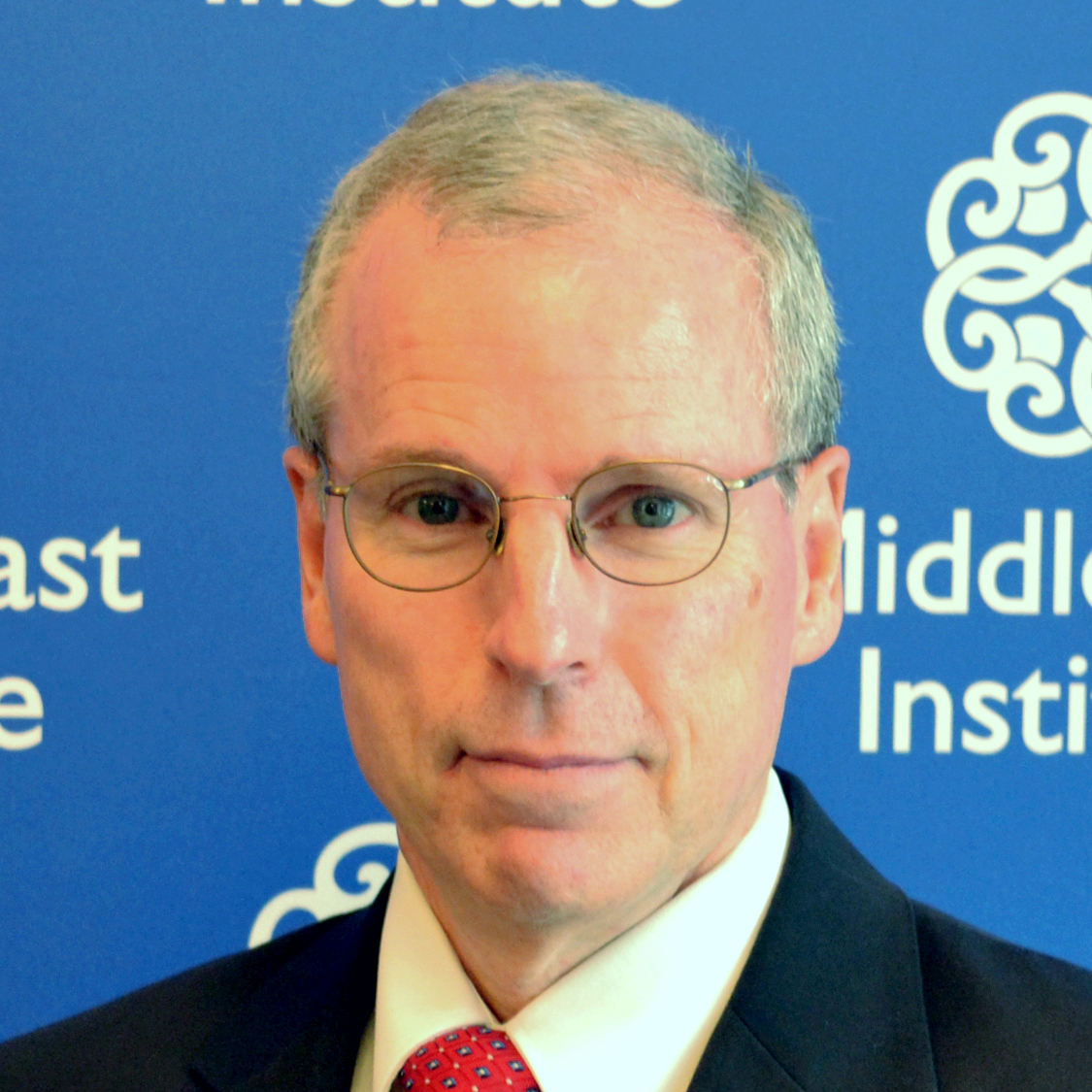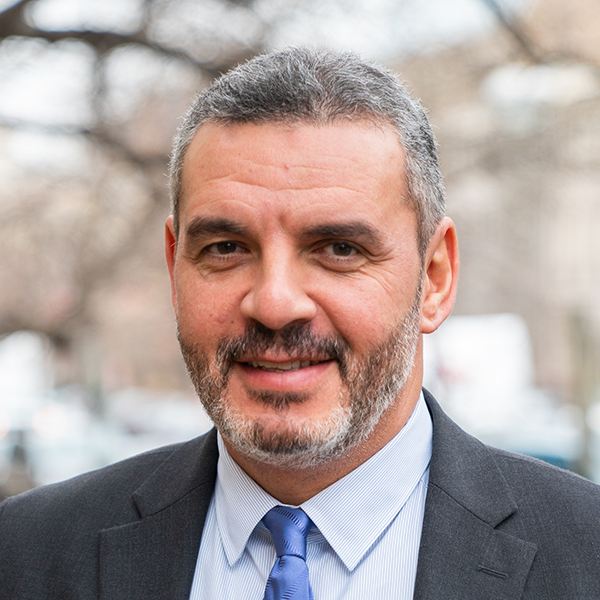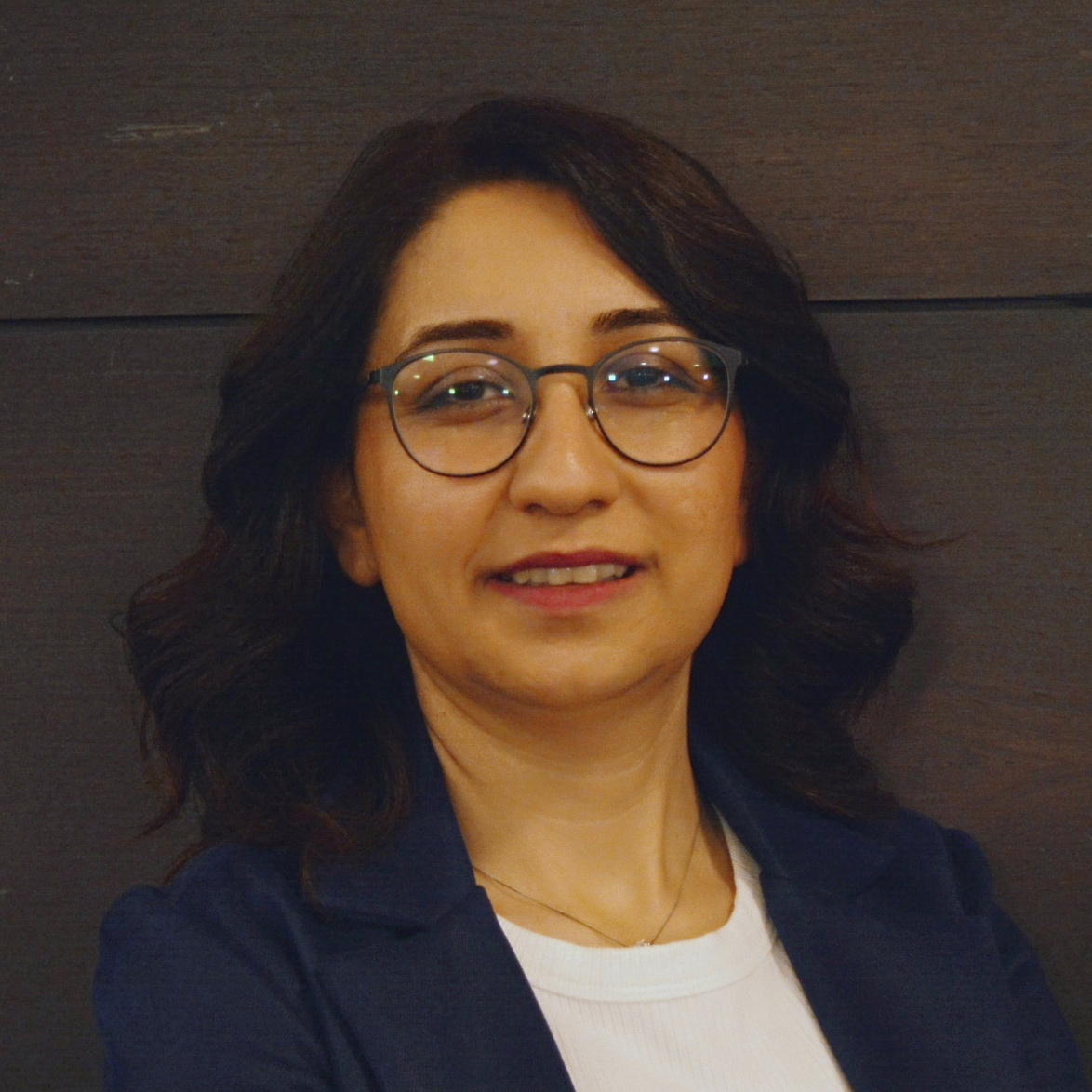Contents:
- An American diplomatic surge
- The MENA region’s crackdown on free thought
- Palestinian elections postponed indefinitely
- Turkey’s COVID challenges highlight broader governance woes
- Lebanon returns to the table for maritime border negotiations with Israel
An American diplomatic surge
Robert S. Ford
Senior Fellow

An interagency American delegation led by National Security Council Middle East Coordinator Brett McGurk is in the Middle East this week, the most senior administration team to visit Arab states. Their first stop was in Saudi Arabia, where State Department and Defense Department officials met the Saudi foreign minister on May 2. Meanwhile, Sens. Chris Van Hollen and Chris Coons, the latter a close political ally of President Joe Biden, met with Emirati leader Crown Prince Mohammed bin Zayed on May 3. The Americans are emphasizing the administration’s commitment to Gulf security, even as the U.S. acknowledges progress on restoring American and Iranian adherence to the 2015 nuclear deal. The Biden administration asserts that restoring the agreement is a step toward further negotiations to address Iran’s missile program and its intervention in regional trouble spots, including Syria, Yemen, and Iraq. These visits come amid an uptick of diplomacy and discussions between Iran and the Gulf states. Saudi and Iranian officials held private talks in Baghdad in early April and there are planned follow-up meetings.
In contrast to the Trump administration, the Biden administration has not much warmed to the Saudi government and McGurk’s delegation will raise human rights issues and the Saudi 2030 economic plan while in the kingdom.
The Democratic Party senators and the administration team also are underscoring the administration’s commitment to boosting humanitarian aid deliveries to Yemen and ending the civil war, and they are pushing for Saudi and Emirati help. The administration’s special envoy to Yemen, Tim Lenderking, will be in Oman and Saudi Arabia this week to discuss humanitarian aid access and a cease-fire. While the administration approved a $23 billion arms package to the UAE, Sen. Coons told reporters on May 3 that he sought assurances from the Emiratis about their use of American weaponry as well as Emirati guarantees about the technology’s security.
McGurk’s team will visit Cairo and Amman later this week where they will brief on Iran and Yemen and discuss bilateral economic cooperation. The Egyptians and Jordanians may raise the Israeli-Palestinian conflict, an issue of less concern to Washington. McGurk’s team will also raise human rights issues again, but they may not get much from Cairo, where President Abdel-Fattah el-Sisi extended the state of emergency again in late April.
Follow on Twitter: @fordrs58
The MENA region’s crackdown on free thought
Antoun Issa
Non-Resident Scholar

It's been seven years since I helped organize a regional bloggers conference in Amman that brought together leading citizen journalists from across the Middle East and North Africa (MENA). We spent three days in workshops trying to devise means to resist the encroaching counter-revolution being steered by the region's authoritarian regimes and a slew of non-state actors who shared their disdain for independent thought. Year after year since that workshop, I've sat and watched as many of those faces at the Amman conference either disappear behind bars or are forced to flee and surrender the fight.
In 2021, MENA shamefully ranks as the worst region in the world for press freedom — 89 journalists in the Arab world are currently rotting in jail. The heavyweights — Saudi Arabia, Iran, Egypt, and Turkey — are leading the regional trend in silencing even a hint of criticism, and sometimes through unthinkable brutality as witnessed by the tragic fate of Jamal Khashoggi and Roohollah Zam. We often write about these powers as being on opposing axes for regional supremacy, but I prefer to see them as allies — allies against freedom of thought. In that pursuit, they operate in tandem.
The ascendancy of the Biden administration offers a ray of hope for a region desperate for positive signs. In his short time in office, President Joe Biden has shown little patience for the belligerence of Iran and the erraticness of Saudi Arabia. But if Biden is looking for avenues to gently nudge the region out of the rut of ruthless authoritarianism, pressuring regional states — particularly those closely aligned to the U.S. — to improve press freedom is the low hanging fruit. It's a realistic compromise Biden can glean from regional leaders in exchange for continued U.S. support; it's low-investment and high-return. It neither has the weighty uncertainty of throwing America in the middle of pro-democracy revolts, nor the tumult of rolling tanks into an Arab capital promising “freedom” and “democracy.” But it will offer a window to breathe for millions in the Arab world suffocating under the relentless crackdown on free thought.
May 3 is World Press Freedom Day.
Palestinian elections postponed indefinitely
Khaled Elgindy
Senior Fellow, Director of Program on Palestine and Palestinian-Israeli Affairs

Last Thursday, after several weeks of planning and preparation, Palestinian Authority (PA) President Mahmoud Abbas officially announced that several election rounds scheduled for this summer would be postponed indefinitely. The elections, the first in 15 years, were to be held in three rounds, starting with PA legislative elections on May 22, followed by presidential elections on July 31, and culminating in elections for the Palestine Liberation Organization’s (PLO) long dormant parliament in exile, the Palestine National Council, on Aug. 31. Despite general skepticism by the public and a highly problematic electoral environment, including draconian restrictions on who could run and the arrest and harassment of candidates by Israel, there was genuine enthusiasm at the prospect of reviving Palestinian politics after years of political stagnation and institutional decline. A total of 36 electoral lists making up 1,391 candidates had registered to contest the Legislative Council’s 132 seats. Abbas announced the postponement just one day before the official campaign period was about to begin on May 1.
The decision was not unexpected. Officially, Abbas cited Israel’s refusal to permit Palestinians in East Jerusalem to participate in the vote as the reason for putting off the election — in effect nixing them, since Israel’s right-wing government is unlikely to allow Palestinian Jerusalemites to take part in any future vote either. But the real reason had to do with divisions within his own Fatah party. Mohammed Dahlan, the former Gaza security chief and Abbas’s arch rival, has built a sizeable support base among disgruntled Fatah activists, particularly in Gaza. More worrisome for Abbas was the decision by Nasser al-Kidwa, a former U.N. ambassador and foreign minister, to form his own list, which earned the backing of Marwan Barghouti, the hugely popular former security chief now serving multiple life sentences in an Israeli jail. Faced with the possibility of his official Fatah list coming in second behind Hamas (or worse), Abbas opted to scrap the elections altogether. Many European and American officials also feared a strong showing by Hamas in the parliament or perhaps their inclusion in a future PA government, which could lead to another international boycott, as in 2006.
While many in the West, particularly in Washington, are quietly breathing a sigh of relief, Palestinians in the occupied territories have reacted with anger and disappointment. Political activists and civil society leaders reject the idea that Israel should have a veto over Palestinian elections and are demanding they be rescheduled immediately. Former PLO executive committee member Hanan Ashrawi summed up the sentiment of ordinary Palestinians in a tweet: “The excitement, enthusiasm &energy with which the Palestinian people in the OPT welcomed the prospect of legislative, pres. &PNC elections were instantly transformed into profound disappointment &anger. Jerusalem is the essence of defiance. not a pretext for subverting democracy!” For its part, Hamas slammed Abbas’s decision as a “coup,” a sentiment widely shared by other electoral lists and candidates as well.
While the full extent of the fallout from the decision to nix the vote remains unclear, there is little doubt that Abbas has done himself considerable damage both at home and abroad as a result. The ageing and increasingly authoritarian Abbas was already highly unpopular, and calls for his resignation are likely to grow even louder.
In hindsight what seems most remarkable is not that Abbas cancelled the elections but that he ever called them in the first place. That Israel would prevent East Jerusalem Palestinians from participating in the vote was predictable. But the fact that Abbas did not foresee the problems within Fatah shows just how insulated and out of touch he is even from his own political base. Moreover, now that Palestinians’ appetite for political change has been whetted, it will be difficult for Abbas to put the genie back in the proverbial bottle. Things may yet get more uncomfortable for both Abbas and Fatah in the weeks to come.
Follow on Twitter: @elgindy_
Turkey’s COVID challenges highlight broader governance woes
Seren Selvin Korkmaz
Non-resident Scholar

Following a peak in COVID infection rates in late April, President Recep Tayyip Erdoğan declared a 17-day lockdown starting last Thursday. While Turkey was successful in implementing early measures against the pandemic last year, it now has the highest infection rate in Europe. According to critics, three major factors are to blame: 1) restrictions were removed too quickly, 2) the vaccination process was too slow, and 3) in March, the ruling Justice and Development Party (AKP) held crowded congresses across the country.
COVID-19 was Turkey's first big crisis after the transition to a presidential regime in mid-2018. Introduced by the AKP with the promise of facilitating fast decision-making and efficient governance, the presidential system appears to be ineffective. The absence of strong checks and balances and governance based on loyalty rather than merit have resulted in a regime that serves the interests of the leader, his party, and those loyal to them, rather than the public. The handling of the pandemic has lacked accountability, the government has provided only limited help to the people, and the rules have been unevenly applied. Despite the prohibition on certain social events and public protests, AKP members have continued to gather at party meetings and funerals. The management of COVID-19 shows that decision-making is designed for the benefit of the government, not society.
In addition, the AKP has used pandemic measures to achieve its own autocratic goals. Following the declaration of the 17-day lockdown, the government announced that alcohol sales would be prohibited for its duration. The restrictions coincide with Ramadan, the Islamic holy month. While the legal status of the ban is still being debated, the government is attempting to enforce it de facto. Erdoğan may have two key agendas with the alcohol ban: a short-term tactical agenda and a long-term ideological one. First, he’s trying to polarize people along one of Turkey's long-standing rifts: secular vs. pious. As the economy deteriorates, Erdoğan has resorted to polarization to rally his base and keep undecided and dissatisfied AKP voters on side. Debates about alcohol sales during Ramadan might serve this purpose. However, the move seems not to have elicited the desired response, as the public is preoccupied with economic issues. Second, the move is a logical extension of his autocratic Islamist agenda. His symbolic wars over the secular lifestyle are still going on and also included the conversion of Hagia Sophia into a mosque and Turkey’s withdrawal from the Istanbul Convention.
As people struggle with hunger and rising food prices, Erdoğan looks to polarization for relief. While the government does not offer economic assistance to the needy, opposition municipalities, solidarity networks, and NGOs do. AKP district municipalities in two conservative areas of Istanbul, Üsküdar and Ümraniye, even tried to stop the Istanbul Metropolitan Municipality — headed by opposition mayor Mr. Ekrem İmamoğlu — from selling cheap bread, angering the public. Erdoğan's struggle with COVID-19 appears to be determining his future in power.
Follow on Twitter: @selvinkorkmaz
Lebanon returns to the table for maritime border negotiations with Israel
Christophe Abi-Nassif
Director, Lebanon program

A U.S. mediation team led by Amb. John Desrocher is traveling to Lebanon on May 3 to facilitate the resumption of indirect maritime border negotiations between Lebanon and Israel. The last round of talks had grinded to a halt late last year amid accusations and counter-accusations of obstruction and provocative proposals from the two sides. The announcement of the renewed negotiations comes two weeks after Under Secretary of State for Political Affairs David Hale’s visit to Lebanon, where he discussed government formation inertia and reiterated U.S. readiness to help restart the border talks.
After years of American shuttle diplomacy landed the framework agreement for the negotiations, the primary issue of contention remains centered around which (if any) of four potential maritime border lines to adopt (lines 1, 23, 29, and the Hof line).
The talks may take many different turns in the weeks ahead. A possible scenario consists of both parties upholding their maximalist approach, which would de facto booby-trap the negotiations and result in a perpetuation of the logjam. Although the resumption of talks may implicitly suggest that both the Lebanese and Israelis are at least open to making concessions, both parties stand ready to expand their demands.
Another scenario reflects a more precarious Lebanese bargaining position. Although Lebanon’s latest border ask at line 29 is scientifically proven and evidence-based, according to the Lebanese Army Command, the country has not shown consistency in its stances, counterintuitively setting the bar low in earlier stages of the negotiations before raising it later on. This may give the Lebanese delegation little room for maneuvering and, by extension, result in suboptimal economic outcomes for a country in desperate need of securing and exploiting its natural resources. In parallel, President Michel Aoun has refused to sign an amended version of Decree 6433, controversially citing the need for governmental approval. This version of the decree would expand Lebanon’s territorial water claims and register the latter with the United Nations, which would complicate Israel’s oil and gas exploration and production activities in the area until the dispute is resolved or arbitrated. It is not yet clear whether Aoun’s decision to withhold signing the decree is wise diplomatic maneuvering to avoid escalation and negotiation inertia or narrow and selfish political calculus to please the Americans. What’s certain, however, is that Lebanon is entering these talks with a lot of economic potential to win or lose. Realizing that potential will require both a unified front at home and a consistent approach at the negotiations table.
Follow on Twitter: @chris_abinassif
Photo by Yasin Ozturk/Anadolu Agency/Getty Images
The Middle East Institute (MEI) is an independent, non-partisan, non-for-profit, educational organization. It does not engage in advocacy and its scholars’ opinions are their own. MEI welcomes financial donations, but retains sole editorial control over its work and its publications reflect only the authors’ views. For a listing of MEI donors, please click here.













